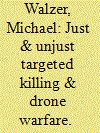| Srl | Item |
| 1 |
ID:
147553


|
|
|
|
|
| Summary/Abstract |
Targeted killing in the “war on terror” and in war generally is subject to familiar and severe moral constraints. The constraints hold across the board; they don't change when drones are the weapon of choice. But the ease with which drones can be used, the relative absence of military risks and political costs, makes it especially tempting not only to use drones more and more, but also to relax the constraining rules under which they are used. It seems clear that the rules have, in fact, been relaxed in the course of the American experience with drone warfare – by presidential decision and without public debate. This essay is an argument for the opening up of the decision process to democratic scrutiny and in defense of the familiar constraints.
|
|
|
|
|
|
|
|
|
|
|
|
|
|
|
|
| 2 |
ID:
147555


|
|
|
|
|
| Summary/Abstract |
The emergence of cyber means and methods of war, force, and coercion raises ethical questions under just war theory different from those historically generated by the development of ever more destructive instruments of war. Whether in armed conflict or contexts not considered war, cyber technologies create political and ethical incentives for their use. However, this attractiveness poses potential risks and dangers that, at present, are largely speculative but invite more ethical deliberation. Unfortunately, the convergence of political and ethical incentives on cyber in a context of increasing geopolitical competition and conflict make the prospects for ethical consensus on just and unjust cyber coercion, force, and war unlikely.
|
|
|
|
|
|
|
|
|
|
|
|
|
|
|
|